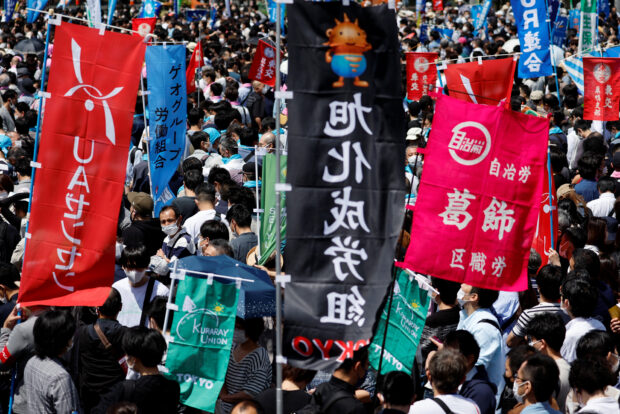
Members of the Japanese Trade Union Confederation, commonly known as Rengo, gather at their annual May Day rally to demand higher pay and better working conditions in Tokyo, Japan April 29, 2023. REUTERS/Issei Kato/File photo
TOKYO -Japanese firms offered the biggest pay hikes in three decades at this year’s negotiations with workers, the country’s largest trade union group said on Wednesday, a development economists say will help revive anemic consumer demand.
A survey conducted by Rengo, Japan’s umbrella trade union group, showed pay hikes first reported by unions at the largest employers in March were now broadening to workers at small and medium enterprises (SMEs), or those with unions of 300 or fewer members.
The final survey of 5,272 unions affiliated with Rengo showed an average pay hike of 3.58 percent, or 10,560 yen ($73.04) per month, the biggest increase since 3.9 percent seen in 1993. Among them, SMEs raised wages by 3.23 percent, also the fastest pace in three decades.
Wage growth is one of the key trends the Bank of Japan (BOJ) is closely watching as it considers if and when it should unwind its ultra-loose monetary stimulus.
BOJ set to keep ultra-low rates, may signal inflation overshoot
BOJ Governor Kazuo Ueda has repeatedly stressed the need to keep policy accommodative until wages increase enough to keep price growth sustainably around its 2 percent target.
BOJ policymaker calls for keeping low rates, focus on wages
“Rising prices and a chronic labor crunch are driving up wages, which will continue to rise next year. What’s important from now on is to bring real wages to positive territory,” said Hisashi Yamada, economist and Hosei University professor.
“Rising wages will help stabilize inflation at 2 percent towards next year, keeping the central bank under pressure to scrap yield curve control sooner or later.”
Japan fiscal 2022 real wages fall most in 8 years as inflation bites
The pay hikes could provide some political support for Prime Minister Fumio Kishida who has made wages as key part of his policy agenda, as a weak yen and higher import prices drive up living costs.
Japanese wages have been virtually flat since the asset bubble burst in the 1990s and are now well behind the average for the OECD members.
Big firms’ summer bonus payments are seen rising 3.9 percent, up for a second straight year, although gains are likely to be uneven, according to a survey by Keidanren, Japan’s biggest business lobby.
($1 = 144.5700 yen)